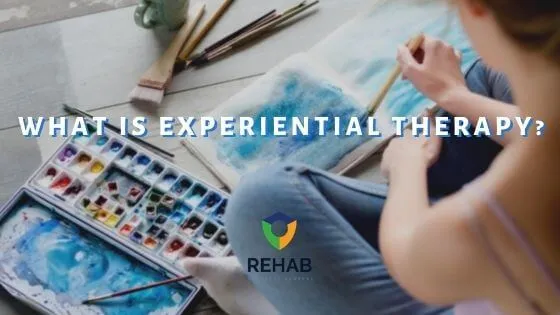Table of Contents
Individuals who struggle with addiction and substance abuse often deal with unresolved trauma as well. People recovering from addiction must also recover from the possible causes of their substance abuse, such as mental health and trauma-related issues. Fortunately, a treatment method known as experiential therapy is known to help recovering addicts and alcoholics to heal from their past traumas. Experiential therapy in addiction treatment involves hands-on activities that are designed to help individuals process, cope with, and heal from trauma.
Sometimes, people may feel uncomfortable speaking with a therapist in traditional addiction treatment settings about traumatic experiences. Experiential therapy allows patients to recover in an environment they feel comfortable in, such as an art studio or the outdoors. Common types of experiential therapies may include rock climbing, music therapy, wilderness therapy, recreation therapy, sculpting or art therapy, as well as adventure therapy. This form of therapy helps recovering addicts and alcoholics to unlock repressed feelings and emotions while learning to cope and heal from traumatic experiences.
Experiential Therapy in Addiction Treatment
Experiential therapy is a form of addiction treatment intended to help people in recovery develop a secure sense of self by processing and healing from buried emotions and past traumas. Through this form of treatment, patients learn how to face difficult issues without turning to drugs or alcohol for an escape. Physical activities such as hiking and rock climbing help individuals in recovery stimulate real-world stress that, as a result, they learn how to overcome. With this in mind, experiential therapy is perfect for helping recovering addicts to learn to cope with stressors such as cravings and substance abuse triggers.
Experiential therapy is effective in treating co-occurring disorders that are common among recovering addicts and alcoholics. By treating these disorders, patients deal with less mental-health-related stressors and triggers, reducing the overall likelihood of relapse.
Co-occurring disorders commonly treated with experiential therapy include:
- Depression
- Anxiety
- Eating disorders
- Obsessive-Compulsive Disorder (OCD)
- Post-traumatic Stress Disorder (PTSD)
Techniques Used in Experiential Therapy
Experiential therapy sessions may include several treatment exercises, with each one being tailored to the patient’s specific treatment needs. Let’s take a look at the most common techniques regarding experiential therapy in addiction treatment.
Equine-Assisted Psychotherapy
Equine-assisted psychotherapy (EAP) is a therapeutic exercise that utilizes horses. While patients typically do not ride the horses, they will groom, feed, harness, and walk them throughout the session.
EAP helps patients through interaction with horses. This works by revealing emotional insights about a patient’s emotional or mental state through peaceful interaction with animals. Additionally, equine-assisted psychotherapy helps recovering addicts process negative feelings or traumas they might not have recognized or addressed otherwise.
Eye Movement Desensitization and Reprocessing (EMDR)
EMDR therapy allows patients to visualize a specific traumatic event while a therapist leads them through specific eye movements meant to help in processing. Eye Movement Desensitization and Reprocessing therapy is proven to be effective for helping patients in recovery to decrease negative emotions and feelings of distress that often lead to substance abuse.
Art Therapy
Art therapy is a form of therapy where recovering addicts are asked to express themselves through the use of art or music. By creating art, patients are able to work through distressful and negative emotions while processing them healthily, rather than turning to substances. This teaches patients an additional, positive coping mechanism to use in place of drugs or alcohol.
Adventure Therapy
Adventure therapy usually consists of outdoor activities such as hiking, camping, biking, rock climbing, and even white-water rafting. Adventure therapy is effective in aiding recovering addicts to develop personal responsibility, problem-solving skills, and communication skills, all while working within a group setting.
Experiential Therapy Used With Additional Treatments
Experiential therapy is not intended as a stand-alone treatment for drug and alcohol addiction. In fact, individuals recovering from addiction should always begin with a medical detox program. Because of the often severe symptoms of drug and alcohol withdrawal, medical detox is vital in ensuring one’s safety when coming off of any substance. Additionally, either inpatient, outpatient, or a combination of the two treatments should be attended while recovering from addiction as well. Some inpatient and outpatient addiction treatment facilities may utilize experiential therapy as a core treatment in their programs.
However, it is important to note that experiential therapy should be used alongside other forms of therapy. Experiential therapy is often utilized in conjunction with other psychotherapy techniques such as motivational enhancement therapy and cognitive behavioral therapy. This helps individuals to focus on altering self-destructive behaviors. Additionally, the activities included in these therapies allow recovering addicts to apply the life skills they learn during psychotherapy sessions in practical, hands-on environments.
Attend Experiential Therapy for Addiction Recovery Near You
If you are suffering from the effects of substance abuse, contact us to find an addiction treatment program that is well-suited to your individual needs. Some drug and alcohol rehab centers specialize in experiential therapies, including obstacle courses, rock climbing walls, and art studios in their facilities. To find a rehab in your state that specializes in experiential therapy, contact us today.
Get Help Today
Don’t go through the process of recovery alone. There are people who can help you with the struggle you’re facing. Get in touch with one today.


